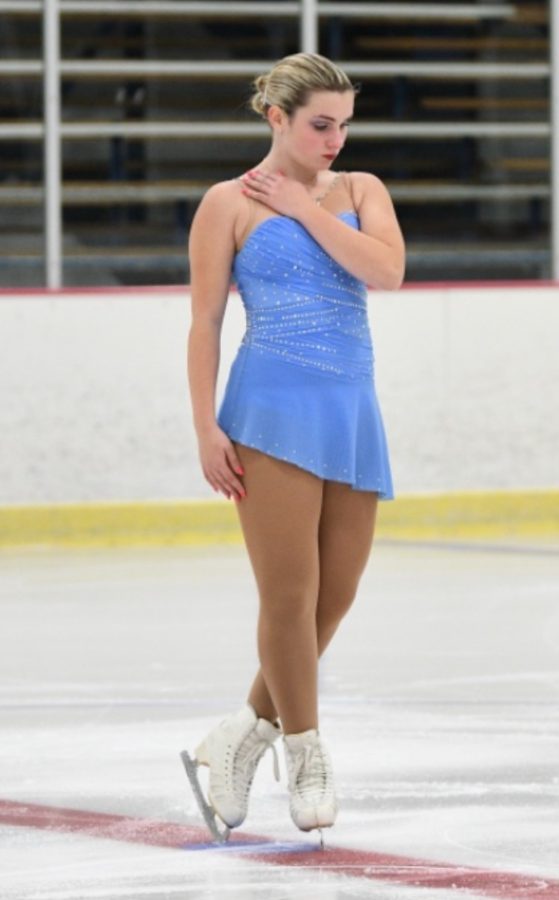Beyond the typical sport
Unique sports speak about what makes their sport special
About 63.7% of students know what common sports like basketball and soccer are according to Bear Facts Student Media 2022 February survey, but what about all of the other sports that are rarely mentioned? There are various sports that are each unique in their own ways. Some people might not even know what certain sports entail, but to others, sports like figure skating, taekwondo, and horseback riding are their passion.
Figure skating
Figure skating is one of many sports that is steadily decreasing in popularity in the US since the early 2000s, according to an article called, U.S. figure skating used to be wildly popular. What happened?, but for Tina Schordel, junior, the rink has been a home away from home since she was 18 months old.
“The first time I went skating wasn’t really my choice, but when I chose to start doing it competitively, something that really drew me [to the sport was] the freedom I got to be able to go out and perform on my own,” Schordel said.
Figure skating is more of an individual sport, according to Schordel, but that aspect is only one of the many things that made her passion grow over the years of practice and competing.
“The individual aspect of the sport is really important to me because for other sports, like team sports, it’s not just you, so you have to rely on your teammates,” Schordel said. “For figure skating, it’s just you who impacts your score. It’s [only] you out there when it’s time to perform.”
Figure skating creates the feeling of freedom according to Schordel.
“I like being able to perform for an audience and specifically on my own for an audience. I also like the feeling that it gives me when I’m able to, just go out there and skate because I feel very free, ” Schordel said.
However, for Schordel, figure skating is more than just performing and competing, she says.
“I like the glitz and glamor of the figure skating costumes; it makes me feel pretty. With figure skating you have a bit more free rein [with choosing your costume],” Schordel said. “Obviously you’re going to want to talk to your coach about what your costume is going to be, but for the most part, it’s a lot more individualistic.”
However, Schordel didn’t always wear a sparkling figure skating costume. Throughout her childhood, she tried as many sports as she could, she said, and figure skating always won her heart.
“I danced. I swam. I did almost everything I could think of. For dance, I didn’t really like the group aspect of it. I like the individuality that skating brings to the table. And then for swimming it was a more individual sport but I didn’t really get to perform and it’s more about the performance for me,” Schordel said.
Similar to other sports, years of practice and commitment are needed to perfect the skills within the sport. In figure skating, Schordel uses her hours of practice to perfect her routine or different tricks and moves. During practice, “I usually like to do jumps or spins, like edge jumps such as a double axel,” Schordel said.
Schordel learns much more than just spins and jumps from figure skating such as skills that she accommodates in her daily life.
“You have to rely on yourself and your abilities. You can’t rely on someone else to tell you to practice because it’s just you who is performing. I’ve had to learn to discipline myself and manage my time a lot because I’m just practicing on my own,” Schordel said. “I have to be able to figure out, how long am I going to work on this? What am I going to work on? How will I get other things done while still being able to practice?”
Figure skating is a unique sport compared to others according to Schordel, but the sport has become less popular over time because of its increasing difficulty.
“At the lower levels, it’s a lot more popular because it’s easier, but figure skating tends to weed out a lot of people. Quite a lot of people will usually drop out at about the junior level because of the increased jump and spin requirements. It’s similar to gymnastics, because there aren’t a lot of people that are in the highest level [as] it gets increasingly more difficult,” Schordel said.
Figure skating may not achieve the same popularity as other sports in the US but to Schordel, figure skating is a huge part of her life and has taught her many important lessons.
“One thing I’ve learned from figure skating is, you can only control yourself, you can’t control other people,” Schordel said. “You can’t control the judges and you can’t think of the outcome of your skill. You just have to be in the moment, be focused, go out and do what you know.”
Taekwondo
There are several different types of martial arts with taekwondo being the third most popular in the US, as well as being the newest Olympic martial art according to an article called Top 5 Most Popular Martial Arts in the World. With 12 years of commitment, taekwondo has become a passion for Orna Stuart, junior black belt.
“I love the training and when we are pushed to not only be the best martial artist we can be but also the best person we can be,” Stuart said.
Competition in the field of taekwondo varies because “there are several different areas of competition. At most competitions there’s forms, sparring, and breaking,” Stuart said.
During competitions and practices, Stuart uses equipment that is not commonly used in other sports.
“We use kicking paddles and bags, as well as weapons such as nunchucks and bo staff,” Stuart said.
Stuart is drawn to not only the skills that she is able to learn while participating in taekwondo, but the environment and the people have become such an important factor of the sport according to Stuart.
“Our dojang, which is the place where we basically train, has a huge family and community environment, which is very accepting,” Stuart said. “The competition is friendly and our instructors spend a lot of time teaching family values like respect and courtesy along with other skills.”
Horseback riding
The bonds between certain animals and humans are so strong that it creates the ability to be able to work together according to an article called Research into the Human-Horse Bond. Emma Flannery, freshman, has been horseback riding and growing a bond with her horse for six years.
“[My horse’s name is] Charlie. Taking care of him is definitely my favorite part of the sport. He’s a thoroughbred and I like that breed more than others because thoroughbreds tend to be a bit more athletic,” Flannery said.
Although Flannery and her horse compete and train together, they work towards earning points for all of the members on their riding team because the points that Flannery and her horse win individually, contribute to the total score for their entire riding team.
“There are circuits where you ride individually. And then there’s also circuits where you ride as a team and get points as a team,” Flannery said. “But I tend to be more focused when I’m individually competing, and it’s also nice to just be able to work one on one with my horse.”
Much different from other sports, horseback riding relies on the bond between the equestrian and their horse more than how one interacts with a team, according to Flannery.
“[Horseback riding] is up to you on how you want to train and compete because it’s just you and your horse, you don’t really have to worry about impressing a team,” Flannery said.
However horses, like many animals, don’t listen all the time, and difficulties can arise, according to Flannery, especially if you are trying to teach the horse new things.
“I’ve definitely learned to be a lot more patient because my horse doesn’t always want to do everything I do, so I have to be patient with him and figure out what will work for both of us,” Flannery said.
While competing, the setup of horseback riding competitions is very different from performing in a dance competition or playing on a soccer field.
“We usually compete and practice in a large facility but when the weather is nice, we sometimes go outdoors in a large arena,” Flannery said. “I’ll do four events for each competition and I do two jumping courses and then one flat course but I prefer to jump.”
Not a lot of people participate in horseback riding because of these drastic differences, but for Flannery, “I like that not a lot of people do it, it’s kind of my own thing just for me.”

Coming back for her last and third year on the Bear Facts staff, Lindsey continues her role as the Sports Editor. As college approaches, she intends to...

